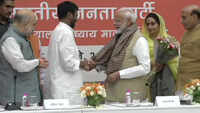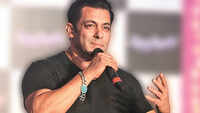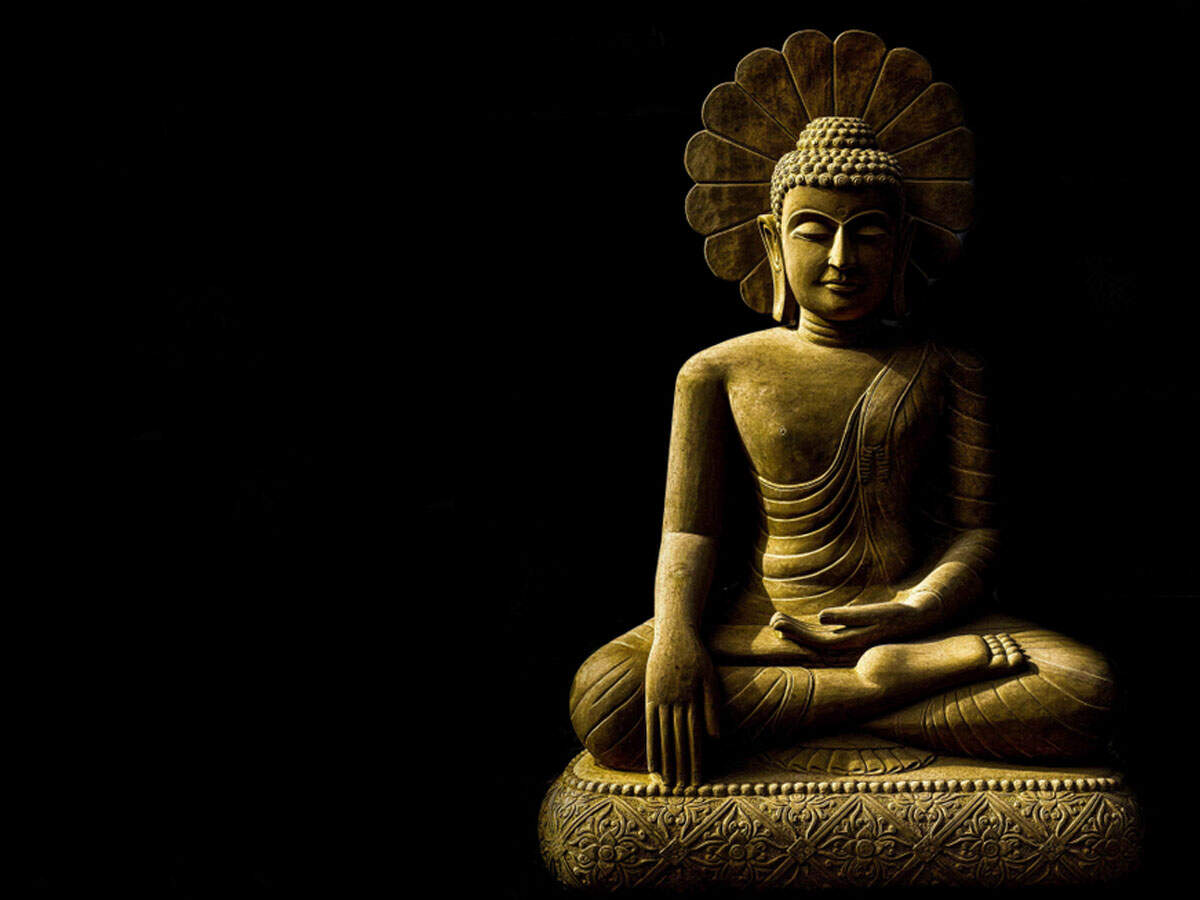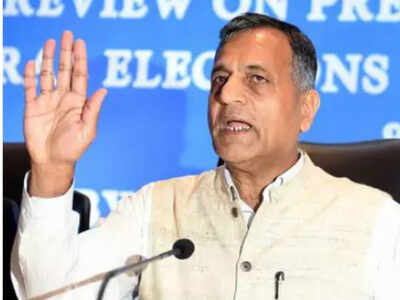
Highlights
NEW DELHI: The Election Commission on Tuesday overruled Ashok Lavasa’s demand for making a member’s dissent on model code of conduct violation cases public and decided that dissent notes and minority views would only be a part of the record but not included in its order.
Sources said CEC Sunil Arora and election commissioner Sushil Chandra were of the opinion that MCC matters were not quasi-judicial proceedings and hence did not require dissent or minority views to be conveyed as part of the final order.
They concurred that while a member’s dissenting view must be mandatorily recorded in quasi-judicial rulings issued by the EC after hearings, dissent/minority views in MCC cases should be recorded only on file.
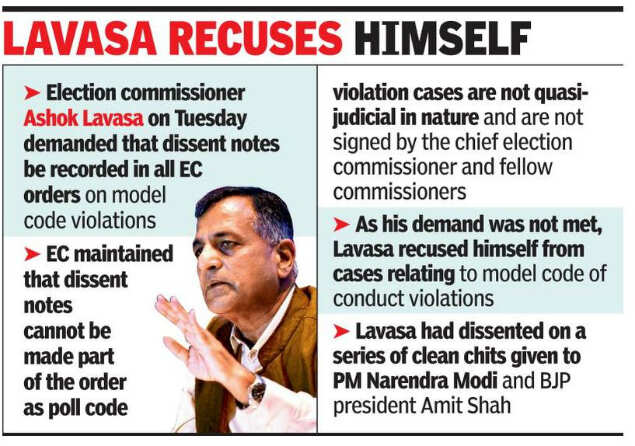
“These file notings (on EC’s orders) can be accessed by the public via the Right to Information Act. The EC has always been transparent and will continue to be transparent,” a commission functionary said.
The poll body, in a press release issued after a full commission meeting convened on Tuesday to discuss Lavasa’s insistence on a “time-bound and transparent” procedure for disposing of MCC cases, said, “It was decided that proceedings of the commission meeting would be drawn, including the views of all commission members. Thereafter, formal instructions would be issued in consonance with laws/rules.”
‘MCC penalties not defined, ECs base action on gravity of violation’
While Arora and Chandra have put their views on file, Lavasa, it is learnt, will submit his views on Wednesday. Lavasa had earlier expressed dissent over the EC’s clean chits to four speeches made by PM Modi and one by BJP chief Amit Shah during the just concluded Lok Sabha campaign.
Arora’s and Chandra’s views rejecting review of MCC procedures were based on opinion submitted by former legal adviser to the commission, S K Mendiratta. Mendiratta had spent over five decades in Nirvachan Sadan.
Mendiratta told TOI that MCC deliberations were never treated by the EC as “quasi-judicial” proceedings. “MCC decisions are just executive orders. There have been several instances in the past when divergent views were expressed by members and officers of the commission but then they decided to go with a particular view. Dissent is not conveyed in the final order as that is done only in quasi-judicial cases. Also, since time is of the essence, the EC sometimes disposes of MCC complaints without a formal order,” he said.
Mendiratta added that it was not possible to spell out consequences for serious violations, as sought by Lavasa, as MCC was not a law with defined penalties. “The three commissioners as per their judgment decide the punishment, depending on the gravity of the violation,” he said.
It is learnt that Tuesday’s meeting was the second one on issues raised by Lavasa first on April 18. “I had demanded that the procedure (for addressing MCC complaints) should be streamlined and made time-bound, transparent and non-discriminatory,” Lavasa told TOI on Tuesday.
The first meeting was held on May 2 but CEC Sunil Arora could not attend for some reason. Chandra disagreed with Lavasa’s demand and opined that a member’s dissent on MCC matters need not be made public since these were not quasi-judicial cases. However, Arora’s absence stalled a decision by majority. Lavasa thereafter sent three letters to the CEC seeking a full commission meeting. At a meeting on May 14, the EC unanimously decided that some groups would be formed to deliberate upon issues, including MCC-related ones, arising out of the 2019 LS polls. However, Lavasa again wrote to the CEC two days later saying he would not be able to attend the meetings on MCC matters unless the full commission discussed his demand.
Sources said CEC Sunil Arora and election commissioner Sushil Chandra were of the opinion that MCC matters were not quasi-judicial proceedings and hence did not require dissent or minority views to be conveyed as part of the final order.
They concurred that while a member’s dissenting view must be mandatorily recorded in quasi-judicial rulings issued by the EC after hearings, dissent/minority views in MCC cases should be recorded only on file.

“These file notings (on EC’s orders) can be accessed by the public via the Right to Information Act. The EC has always been transparent and will continue to be transparent,” a commission functionary said.
The poll body, in a press release issued after a full commission meeting convened on Tuesday to discuss Lavasa’s insistence on a “time-bound and transparent” procedure for disposing of MCC cases, said, “It was decided that proceedings of the commission meeting would be drawn, including the views of all commission members. Thereafter, formal instructions would be issued in consonance with laws/rules.”
‘MCC penalties not defined, ECs base action on gravity of violation’
While Arora and Chandra have put their views on file, Lavasa, it is learnt, will submit his views on Wednesday. Lavasa had earlier expressed dissent over the EC’s clean chits to four speeches made by PM Modi and one by BJP chief Amit Shah during the just concluded Lok Sabha campaign.
Arora’s and Chandra’s views rejecting review of MCC procedures were based on opinion submitted by former legal adviser to the commission, S K Mendiratta. Mendiratta had spent over five decades in Nirvachan Sadan.
Mendiratta told TOI that MCC deliberations were never treated by the EC as “quasi-judicial” proceedings. “MCC decisions are just executive orders. There have been several instances in the past when divergent views were expressed by members and officers of the commission but then they decided to go with a particular view. Dissent is not conveyed in the final order as that is done only in quasi-judicial cases. Also, since time is of the essence, the EC sometimes disposes of MCC complaints without a formal order,” he said.
Mendiratta added that it was not possible to spell out consequences for serious violations, as sought by Lavasa, as MCC was not a law with defined penalties. “The three commissioners as per their judgment decide the punishment, depending on the gravity of the violation,” he said.
It is learnt that Tuesday’s meeting was the second one on issues raised by Lavasa first on April 18. “I had demanded that the procedure (for addressing MCC complaints) should be streamlined and made time-bound, transparent and non-discriminatory,” Lavasa told TOI on Tuesday.
The first meeting was held on May 2 but CEC Sunil Arora could not attend for some reason. Chandra disagreed with Lavasa’s demand and opined that a member’s dissent on MCC matters need not be made public since these were not quasi-judicial cases. However, Arora’s absence stalled a decision by majority. Lavasa thereafter sent three letters to the CEC seeking a full commission meeting. At a meeting on May 14, the EC unanimously decided that some groups would be formed to deliberate upon issues, including MCC-related ones, arising out of the 2019 LS polls. However, Lavasa again wrote to the CEC two days later saying he would not be able to attend the meetings on MCC matters unless the full commission discussed his demand.
Download The Times of India News App for Latest India News.
Make sense of the 2019 Lok Sabha elections and results on May 23 with TOI. Follow us to track latest news, live updates, news analysis and cutting-edge data analytics. Track live election results, the big trends and fastest updates on counting day with India's largest news network.
#ElectionsWithTimes
more from times of india news
Elections 2019
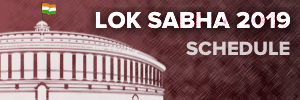
Trending Topics
LATEST VIDEOS
More from TOI
Navbharat Times
Featured Today in Travel
Quick Links
Rajasthan election 2019Andhra Lok Sabha electionGujarat Election 2019Karnataka Election 2019MP Lok Sabha electionMaharashtra election 2019West Bengal Lok SabhaTamil Nadu election 2019UP Election 2019Bihar election 2019UP Election DateAndhra Election DateBihar Election DateAndhra Assembly ElectionLok SabhaMP Election DateMaharashtra Election DateShiv SenaYSRCPTDPWB Election DateJDUCongressBJP newsGujarat Election DateSC ST ActUIDAIIndian ArmyISRO newsSupreme CourtRajasthan Election DateTelangana Election DateTamilrockers 2018Uttarakhand newsSikkim newsOrrisa newsKarnataka Election DateNagaland newsSatta KingManipur newsMeghalaya news
Get the app

